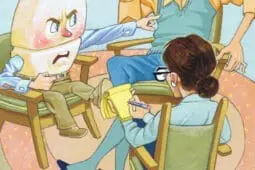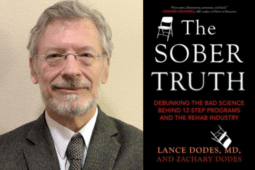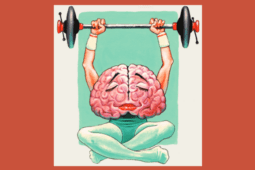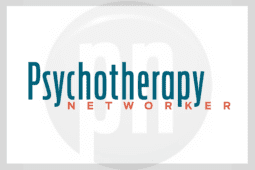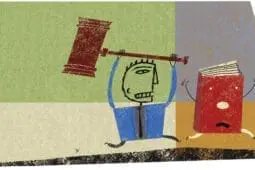The Field
The Power of How
Helping Depressed Clients Make Better Choices: An Interview with Michael YapkoOne of the most useful ways of understanding depression is the stress generation model, based on the idea that depressed people need better skills and... Read more
Bubble-Wrapping Our Children
The Perils of Overprotective ParentingWe've become so focused on keeping children safe that we exaggerate the dangers they face despite the fact that they’ve never been safer. Still, no amount of... Read more
The Downside of Happiness
Beware of What You Wish ForAlthough happiness is widely beneficial, organizing one’s life around it can lead to a great deal of effort and time being spent unwisely. Trying too hard to... Read more
Bessel van der Kolk, a leading trauma therapist, takes on the New York Times. Read more
The Power of the Pen in Therapy
Some Journaling Exercises to Enhance Your WorkSome guidelines for bringing the creative power of therapeutic journaling into your work. Read more
Questions of Gender
A therapist struggles with the clinical choices he’s madeA therapist takes an unflinching look at a puzzling case that spanned 14 years, wondering if he made a wrong turn. Read more
The Tribal Classroom
Applying attachment theory in schoolsLou Cozolino believes that attachment theory and neuroscience may offer the key to transforming our troubled educational system. Read more
Falling in Love Again
A Brief History of Psychoactive DrugsOver the last 150 years, we’ve seen waves of mass infatuations with psychotropic drugs—antidepressants being the latest. While all these drugs are... Read more
Beyond Chemistry
Exploring Our Relationship with Our MedsThe chemical effect of psychoactive meds is only part of their impact. In fact, people often develop complex relationships with the pills they take. Read more
The Anatomy of a Psychiatric Consult
Solving the PuzzleFor many therapists, an air of mystery surrounds the role of psychopharmacology in mental health treatment. Here's a step-by-step tour of the complexities of... Read more
The Meds of the Future
Waiting for the Next Magic PillDoes our growing understanding of the brain and the prospect of further scientific discoveries mean there’s a new generation of magical pills on the horizon? Read more
SSRIs in Perspective
Have They Lived up to Their Promise?After wading through the controversies and contradictions in the research literature on SSRIs, a critic of Big Pharma explains why he thinks these drugs may... Read more
The Challenge of Becoming the Boss
How to Make a Group Practice WorkMaking a group practice work means taking on the challenge of becoming a boss. Read more
VIDEO: The Hidden Toll of DSM-5 on Psychotherapy
How Increasing Medication Sales Hurt the Therapy ProfessionAllen Frances—author of "Saving Normal: Has Psychiatric Diagnosis Gotten Out of Control?"—is one of DSM-5’s most outspoken critics, but his ultimate... Read more
VIDEO: The Increasing Role of Biology in the DSMs of Tomorrow
How Genetics Shape PsychopathologyRather than continuing to lament the deficiencies of DSM-5, forensic psychiatrist David Mays wants to focus on what's ahead for the psychotherapy field. In his... Read more
12 Missteps?
The evidence that AA works is many steps behindThe authors of a provocative new book argue that, despite its sterling reputation, alcoholics anonymous has one of the worst success rates in all of medicine. Read more
Do Brain Games Build Cognitive Muscle?
Grim Job Prospects for Mental Health GradBrain games and grad prospects Read more
The Case for Neurofeedback
Rewiring the brain in the consulting roomThe increasing popularity of neurofeedback is based on the growing evidence that a wide variety of psychological disorders can be understood as firing mistakes... Read more
Brain Imaging and Psychotherapy
Why is it so controversial?For nearly 20 years, psychiatrist Daniel Amen has led a controversial crusade to make brain imaging an accepted part of psychotherapeutic practice. Read more
Understanding the Dangers of Diagnostic Epidemics
The Most Powerful Psychiatrist in America on Why DSM-5 Is a Step BackwardAllen Frances learned first-hand how, even when motivated by the best of intentions, changes in the “bible of psychiatry” can have large-scale negative... Read more
VIDEO: How Meeting Condition Criteria Doesn't Equal Mental Disorder
Jack Klott on One of the Diagnostic Changes in DSM-5While the publication of DSM-5 came with many surprises, few were as shocking—or as controversial—as the number of changes made to diagnosis specifiers... Read more
VIDEO: DSM-5 and the Elimination of Disorders
Martha Teater on the Removal of Asperger's from DSM-5Asperger’s no longer exists—at least not in the DSM-5. And there are other changes, like the omission of sexual addiction, that many therapists are... Read more
The Best DSM Ever Written?
Jack Klott, an Advocate for DSM-5, Speaks OutJack Klott discusses the DSM5 and why it's a triumph in the field, despite its flaws. Read more
VIDEO: Is Psychotherapy Becoming Overly Diagnostic?
Allen Frances on Why DSM-5's New Diagnoses Aren't NecessaryOne of the most note-worthy changes in the DSM-5 is the abundance of new diagnoses that are included in this new edition. Many DSM-5 critics worry that this is... Read more
Discover How DSM-5 Will Affect Your Practice
Martha Teater on One of the Major Changes in DSM-5Martha Teater discusses a huge change in the DSM-5 that many therapists are still adjusting to—diagnosis-specific severity scales. Read more
The Cult of DSM
Ending Our Allegiance to the Great GazooLabeling clients with DSM diagnoses is a ritual most of us perform to get reimbursed and pay our mortgages, but few of us actually believe in. Has the time... Read more
The Book We Love to Hate
Why DSM-5 Makes Nobody HappyFrom small insignificant beginnings in 1952, when almost nobody read it, DSM has become a kind of sacred literary monster. Today, it’s the most detested and... Read more
Shedding Light on DSM-5
The View from the TrenchesWhile the polemical debates over the new DSM have received widespread coverage, the reactions of ordinary clinicians have yet to receive much scrutiny. Read more
Soft Shock Therapy
The Art of Speaking the UnspeakableUsing humor to help clients reconstruct their problems, even to the point of making parodies of their own dilemmas, can help some them get distance from their... Read more
Whose Therapy Is It Anyway?
When Your Client Is Uncommitted to ChangeWhen we find ourselves haunted by a particular case, it may mean that we’re more invested in the client making changes than the client is himself. Read more









